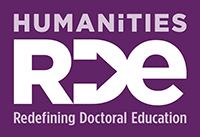
In the first years of the RDE initiative, individual faculty members applied for funding to create innovative courses or seek out new skills. With this next stage, the Cluster Grant approach asks faculty members to imagine how RDE funding could benefit a department or program as a whole. Please see Cluster Grants for funding opportunites.
The information below is included for archival purposes.
In order to bring substantive transformation to our curriculum, we will offer summer grants to faculty and their partners in support of new graduate curricular initiatives. Grants will be available to support curricular innovation within a department (“standard grant”), but will be primarily targeted at interdisciplinary or inter-institutional teams of two to three faculty interested in co-teaching across academic borders. These “bridge grants” will support collaboration between departments and schools at Washington University, as well as between humanities departments at Washington University and neighboring institutions (universities, community colleges, museums, secondary schools, etc.). We are especially interested in supporting curricular innovation that includes the capacity building outlined above: quantitative and digital skills, collaboration, writing for multiple audiences, public presentation, and humanities pedagogy beyond the research university.
We foresee an exciting range of possibilities from this initiative. For example, the bridges that the Department of Art History and Archaeology have already built to the Saint Louis Art Museum through its various internship programs provide a solid foundation for more expansive curricular innovation, not only involving Art History and Archaeology, but History, Romance Languages and Literatures, or East Asian Languages and Cultures. Faculty in History and Urban Design, through the Divided City initiative, are already collaborating with colleagues at a number of institutions, including Harris-Stowe State University, the Griot Museum, the Missouri History Museum, and the Vashon African American Museum and Research Center. We can imagine a range of new courses involving internships, archival preparation, and digitalization emerging from these existing partnerships.
We also hope to build on our existing connections to area community colleges and high schools, where several Washington University humanities PhDs, who contributed to our Next Generation planning, are currently tenured teachers. For example, in collaboration with neighboring high schools and St. Louis Community Colleges, and in consultation with our Department of Education, we foresee the development of innovative teacher training courses that would provide PhD students with the opportunity to learn about best pedagogical practices from expert colleagues at the high school and community college level.
Standard curricular innovation summer grants will be $7,500. Bridge grants, depending on the number of faculty and partners involved, will range from $10,000 to $20,000. Our goal is to fund four standard grants and eight bridge grants over the five-year period of the initiative, with the end result being at least twelve new humanities graduate courses by the fall of 2023. The selection committee will consist of a subcommittee of four from our Advisory Committee, as well as two experts from outside Washington University Arts & Sciences.
Grants awarded
Past competitions
2022-23 CALL FOR PROPOSALS & APPLICATION COVER SHEET
FALL 2022 CALL FOR PROPOSALS & APPLICATION COVER SHEET
SPRING 2021 APPLICATION COVER SHEET
SPRING 2021 CALL FOR PROPOSALS
